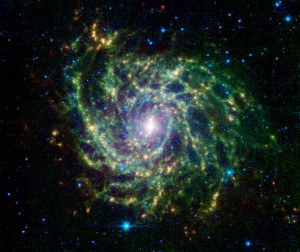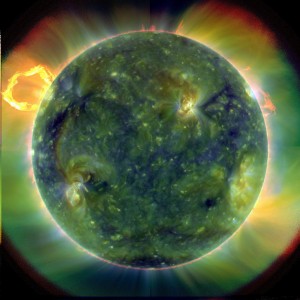(View the book’s Table of Contents)
From the Preface to Let There Be Light
This is a book for people wondering about modern science and religion, and what each has to say to the other, if anything. It is also for people curious about the discoveries of modern cosmology and physics, or about the insights of Kabbalah and Jewish mysticism, but who know little about them. Those who may never before have picked up a book on popular science, or who think of themselves as indifferent to or inept at science, should find the material here both fascinating and understandable. On the other hand, scientifically literate readers who may never have heard of the Kabbalah or who have decided they are uninterested in religion, will, I hope, take away a new appreciation of religion, as well as learn something more about our current understanding of the world. I have written this book for all of you, and I have tried to make it completely and easily accessible.
Let There Be Light is deliberately not a scholarly work. I have gone out of my way to avoid jargon, footnoted attributions, and even the expansive and detailed thoroughness of most popular science books. I am not trying to explain these subjects comprehensively. Actually, quite the opposite: I worked hard to keep each theme short and completely approachable, and I restricted my discussions to what I thought was the minimum necessary to interest, inform, and intrigue you. I certainly steered clear of the academic diligence of my technical articles. This book is, however, meant to educate and perhaps enlighten you. Brian Greene remarks that his book The Elegant Universe, an excellent and readable volume, was sufficiently complicated to give his mother a headache. I wrote this book to give your mind, and your spirit, a tingle.
The creation of the universe, quantum physics, and Jewish mysticism are profound and intricate subjects. My strategy is to hold your interest as we navigate among them. I have learned from years of lecturing on this subject that I stand a good chance of losing your attention if I introduce unnecessary, albeit interesting, tangents. Mathematical equations, historical background, and even important physical stipulations can be distractions, and I avoid them whenever they are parenthetical to my main message. While I will not be able to teach you the subtleties of these topics in this small volume, I do hope to explain their essential ideas clearly and painlessly, and I even hope to persuade you that such exploration can intensify your appreciation of this world — God’s world.
The Closing Meditation in Let There Be Light
Modern science and kabbalistic mysticism have provided us with joint insights about our wondrous universe:
We on Earth live at the perceived center of the cosmos. All other places share this property, as we saw in the discussion of general relativity, but ours is, nevertheless, a special kind of condition. The Creation itself took place here, as everywhere, ex nihilo from the basic laws of physics. The event occurred 13.73 billion years ago, although, paradoxically, it is likely that there was never a time when the universe did not exist.
We seem to be the purpose of the Creation. Our universe is the way it is, perfect for life, perhaps for our sake. We may be but an infinitesimal speck in the vastness of the cosmos, but the laws of physics and nature that guide the universe established the extraordinary conditions necessary for our existence. We do not know for certain if this circumstance is due to necessity or luck, but we are surely blessed.
We are engaged in a quest for knowledge and meaning. There is humility in recognizing as we search that we are sophisticated yet ignorant, and that there is a unity derived from God’s Oneness that permeates and interconnects everything in the world. Learning about the world is therefore an ongoing pursuit, simultaneously scientific and religious in nature, in which we benefit from the combined efforts of all other seekers. Our growing knowledge transforms mystery into wisdom, and wisdom into wonder.
We share responsibility for the universe. Not only are we peculiar, complex, and intelligent, we have the gift of awareness. Our free will and self-consciousness, according to the still mysterious quantum mechanical framework of the universe, affect reality. Life may or may not be common in the universe — we do not know — but intelligent life is not very common. Perhaps we are alone.
We have also been bestowed with an awesome dominion over the Earth. By our actions we contribute to perfecting the world — tikkun olam — and by our actions, as the universe expands, most likely forever, we partner with the Divine for a Messianic age. Our good deeds help to illuminate the world, while meanwhile we ourselves strive for enlightenment.
“By Your light,” says the Psalmist, “will I be enlightened” (Psalm 36:10).
Let there be light.


